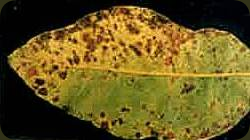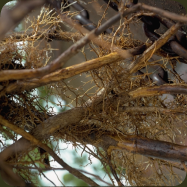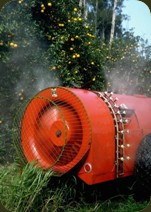Research
Diaprepes Biocontrol

The Diaprepes
Root Weevils is the most serious insect pest of citrus in the United States.
Diaprepes abbreviatus has become established in many crops in Florida, including corn, sugarcane, woody ornamentals, and more than 18% of Florida's commercial citrus acreage is now infested since its discovery in 1964.
Since the 1964 discovery of D. abbreviatus in Florida, vast amounts of research has been conducted towards construction of an effective
Integrated Pest Management (IPM) program for citrus growers.
Still lacking though is a meaningful understanding of the ecological relationship of pest (D. abbreviatus) and pathogen (Phytophthora
spp.).
Click here to learn more…
Greasy Spot

Greasy Spot is a major foliar and fruit disease on citrus in Florida. It is caused by the fungus,
Mycosphaerella citri. Prior work at the Kerr Center has demonstrated suppression of Greasy Spot by the use of micronutrient sprays containing KeyPlex 350 to almost the same degree as copper fungicides when used with petroleum spray oils.
Recently some investigators have demonstrated systemic acquired resistance with the use of salicylic acid.
This study was undertaken to investigate the possible use of salicylic acid in combination with the product KeyPlex 445 as a nutritionally based crop protectant for citrus.
Click here to learn more…
Phytophthora / Diaprepes Complex

The interaction between Diaprepes abbreviatus and Phytophthora spp is known as the
Phytophthora-Diaprepes Complex (PDC) and has become increasingly important in Florida.
Although the extent of the current impact of PDC to Floridas citrus industry has not been determined, the devastation to a single citrus grove can result in a total loss for the grove owner.
Specifically, PDC frequently results in tree mortality due to the secondary infection by
Phytophthora spp. at the lesions produced by larval feeding on the roots.
Chemical treatments for both insect and fungus are extremely expensive; therefore the ability to provide treatments by prescription application would offer tremendous cost savings to the grower while reducing any environmental impact.
Click here to learn more…
Biopesticides Development

New, nontoxic methods are the future for pest control as insects quickly develop resistance to chemical pesticides. Non-native pests are presently threatening growers, such as the Diaprepes Root Weevil, the Citrus Leafminer, and the Brown Citrus Aphid. Most conventional pesticides are expensive and can be harmful to humans and the environment if not used properly. Growers are under increasing pressure to comply with new and costly worker protection standards and other government regulations. Alternative methods of insect pest control offer promise for cost-effective, non-toxic, long-term solutions.
FlaRes continually tests new methods of insect control and is active in working towards eradicating Diaprepes and other pests of Florida citrus. Examples include the use of Neem Seed Extract (a source of an insect growth regulator), the use of attractants and repellents, the use of entomopathogens such as nematodes and fungi as well as natural insect predators and parasitoids. Advances in biotechnology have made many of these methods much more economical and therefore more attractive to growers than ever before.
Rootstock Trial

Conducted with the following researchers: James H. Graham, UF/CREC, Lake Alfred; Kim D. Bowman, USDA/ARS, Ft. Pierce; Robert C. Adair, Jr., FLARES, Vero Beach, FL
Click here to learn more…



